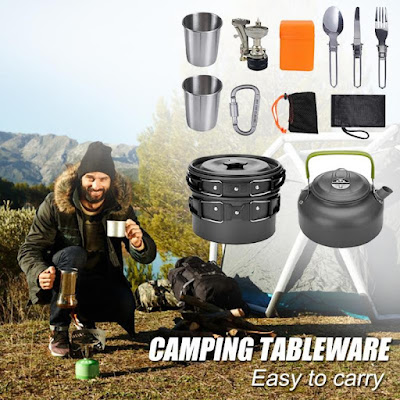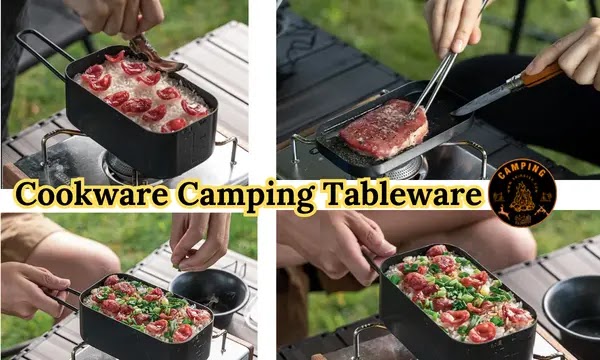best Camping Guide 2023: Your Roadmap to Outdoor
Welcome to the Ultimate Guide to Camping, where we explore the exciting world of outdoor adventures and help you make the most of your camping experiences. Whether you're a seasoned camper or a novice explorer, this guide will provide you with invaluable insights on campgrounds, RV parks, and CampingWorld – everything you need to know to embark on unforgettable camping journeys. From choosing the perfect campground to discovering the best RV parks and exploring the offerings of CampingWorld, get ready to immerse yourself in the wonders of nature and create lasting memories under the open sky. Let's dive into this comprehensive guide and unlock the secrets to an extraordinary camping experience.
1-What you need
2- Where to camp
3- How to camp
4- Camping safety.....and more
The first thing you need to do is gather your supplies. This will vary depending on the type of camping you're planning, but here are some basic items you'll need:
1- Tent: Choosing the right tent size and type
2- Sleeping bag
First, think about the temperature rating that matches the conditions you'll be camping in. Whether it's a warm summer night or a chilly winter escapade, selecting the appropriate temperature rating ensures a comfortable sleep. Another important factor is the type of insulation—down or synthetic—each with its own pros and cons. For a more in-depth exploration of sleeping bags, you can visit websites like. www.hykeandbyke.com
3- Sleeping pad
A sleeping pad is a vital component of a comfortable camping sleep system. It provides cushioning and insulation between your body and the ground, enhancing your overall sleeping experience. Sleeping pads come in various types, including self-inflating pads, foam pads, and air pads. Self-inflating pads offer convenience with built-in air chambers that automatically fill when opened. Foam pads provide excellent insulation and durability, while air pads offer adjustable firmness and compactness. When selecting a sleeping pad, consider factors like thickness, weight, insulation, and packability. A quality sleeping pad not only improves your comfort but also helps to insulate you from the cold ground, ensuring a better night's rest during your camping adventures you can visit websites like.www.hykeandbyke.com
4-Stove
A stove is an essential piece of camping equipment that allows you to cook meals and boil water conveniently in the great outdoors. Portable camping stoves come in various types, including propane, butane, and multi-fuel stoves. Propane stoves are popular for their ease of use, efficiency, and availability of fuel. Butane stoves are lightweight and compact, making them ideal for backpacking and solo camping trips. Multi-fuel stoves offer versatility by allowing you to use different types of fuel, such as white gas, kerosene, or unleaded gasoline. When choosing a camping stove, consider factors such as size, weight, fuel efficiency, cooking power, and stability. A reliable camping stove ensures that you can enjoy hot meals and beverages during your outdoor adventures, adding a touch of comfort to your camping experience you can visit websites like.www.broadout.com
Bulin 5800W Ultralight Windproof Camping Gas Stove, Portable Backpacking Hiking Gas Stove Burner Propane Butane - $29.99
from: BRoadout
5- Food
When it comes to cooking and food supplies for camping, proper preparation is key to enjoying delicious meals in the great outdoors. It's essential to have the right cooking equipment and food items to make your camping culinary experience a success. As for food supplies, plan your meals in advance and pack non-perishable items like canned goods, dried fruits, trail mix, and energy bars. Don't forget to bring along a cooler to keep perishable items fresh. Proper meal planning and having the right cooking tools ensure that you can enjoy tasty and satisfying meals while immersing yourself in the beauty of nature.
6- Water
Water is a fundamental necessity when camping, as staying hydrated is crucial for your well-being in outdoor environments. Depending on your camping location, water sources may vary. Some campsites provide access to clean drinking water, while others require you to bring your own. It's important to check ahead of time and plan accordingly. If you need to bring your own water, consider carrying enough for drinking, cooking, and hygiene purposes. Collapsible water containers or water bladders are convenient for storage and transport. Additionally, portable water filters or water purification tablets can be valuable tools for treating water from natural sources like streams or lakes. Remember to prioritize water safety and cleanliness to ensure a safe and enjoyable camping experience.
7- First-aid kit
A first-aid kit is an essential component of your camping gear, ensuring you're prepared to handle minor injuries and ailments during your outdoor adventures. A well-stocked first-aid kit typically includes items such as adhesive bandages, gauze pads, adhesive tape, antiseptic wipes, tweezers, scissors, pain relievers, insect repellent, and sunscreen. It's important to customize your kit based on the specific needs of your camping trip, considering factors like the duration, location, and activities you'll be engaged in. Additionally, familiarize yourself with basic first-aid procedures and carry a first-aid manual or guide for reference. Online resources like the American Red Cross (www.redcross.org) provide comprehensive guidelines on assembling a complete first-aid kit. Prioritizing safety and being prepared with a well-stocked first-aid kit can give you peace of mind and ensure prompt care in case of minor emergencies while camping.
8-Flashlight
A flashlight is an essential tool for camping, providing illumination and safety during nighttime activities. Whether you're setting up camp, navigating trails, or finding your way to the restroom, a reliable flashlight is indispensable. When choosing a camping flashlight, consider factors such as brightness, battery life, durability, and size. LED flashlights are popular for their brightness and energy efficiency. Additionally, look for features like adjustable brightness settings and beam focus to adapt to different situations. Reputable outdoor gear websites like REI (www.rei.com) or Camping World (www.campingworld.com) offer a variety of camping flashlights to suit your needs. Don't forget to pack extra batteries or consider rechargeable options to ensure a continuous power supply. A dependable camping flashlight will enhance your nighttime adventures and provide essential visibility in the wilderness.
10-Map and compass
A map and compass are indispensable tools for navigation and orienteering during camping trips. These traditional navigation instruments allow you to explore and navigate the wilderness with confidence. A topographic map provides detailed information about the terrain, landmarks, and trails in the area you're camping in. It helps you plan your routes and estimate distances. A compass, on the other hand, helps you determine directions and orient yourself on the map. By combining the information from the map and compass, you can navigate through unfamiliar terrain, find your way back to camp, and discover new areas. It's essential to learn how to read a map and use a compass properly. Outdoor education programs or websites like REI (www.rei.com) provide resources and classes on map and compass navigation. Always carry a map and compass as reliable backups, even if you have GPS or smartphone navigation. The map and compass will be your trusted companions when exploring the wilderness and enjoying the freedom of off-the-grid adventures.
11- Insect repellent
Insect repellent is a crucial item to pack when going camping, as it helps protect you from bothersome and potentially harmful insect bites. Mosquitoes, ticks, and other biting insects can be prevalent in outdoor environments, especially during warmer months. Applying insect repellent to exposed skin and clothing creates a barrier that deters insects from landing and biting. Look for repellents that contain ingredients like DEET, picaridin, or oil of lemon eucalyptus, as they are known to be effective against a wide range of insects. It's important to follow the instructions on the repellent packaging for safe and proper use. Additionally, consider wearing long sleeves, pants, and socks, especially during peak mosquito activity times. Keeping insects at bay with the help of insect repellent allows you to fully enjoy your camping experience without the annoyance and potential health risks associated with insect bites.
12- Sunscreen
Sunscreen is an essential item to include in your camping gear to protect your skin from the harmful effects of the sun's UV rays. Spending extended periods outdoors exposes you to increased sun exposure, making it crucial to apply sunscreen regularly. Look for a broad-spectrum sunscreen with a high SPF (Sun Protection Factor) to shield your skin from both UVA and UVB rays. Apply sunscreen generously to all exposed areas, including your face, neck, arms, and legs, and remember to reapply every two hours or more frequently if you're sweating or swimming. Additionally, consider wearing protective clothing like wide-brimmed hats and long-sleeved shirts to further safeguard your skin. With proper sun protection, you can fully enjoy your camping adventures while minimizing the risk of sunburn and long-term damage to your skin.
13- Rain gear
Rain gear is an essential component of your camping gear, providing protection against unexpected rain showers and keeping you dry and comfortable in wet conditions. A quality rain jacket and rain pants are key elements of rain gear, offering waterproof and breathable properties to keep you dry without compromising comfort. Look for rain gear made from durable materials like nylon or Gore-Tex, which provide excellent water resistance and breathability. It's also advisable to choose rain gear with adjustable cuffs, hoods, and waistbands to ensure a proper fit and prevent water from seeping in. Additionally, consider packing waterproof footwear and a waterproof backpack cover to keep your belongings dry. Being prepared with reliable rain gear allows you to confidently explore the outdoors, even when the weather takes a turn for the worse, ensuring a comfortable and enjoyable camping experience.
14- RV parks
RV parks are specially designed campgrounds that cater to recreational vehicles (RVs) and offer a range of amenities and facilities to enhance the camping experience. RV parks provide dedicated spaces with electrical hookups, water connections, and sometimes sewer hookups for RVs. They often feature amenities such as restrooms, showers, laundry facilities, picnic areas, playgrounds, and Wi-Fi access. Some popular websites to find and explore RV parks include Campground Reviews (www.campgroundreviews.com), RV Parky (www.rvparky.com), and Good Sam (www.goodsam.com). These websites provide comprehensive information, user reviews, and ratings to help you find the perfect RV park for your needs. Whether you're looking for a quick overnight stay or a long-term destination, RV parks offer convenience, comfort, and a sense of community for RV enthusiasts, making them an excellent choice for your camping adventures.
Conclusion:
With this comprehensive camping checklist, you can ensure you're well-prepared for your outdoor adventure. Remember to adapt the list based on your specific camping location and duration. By having all the essential gear and supplies, you can relax and enjoy the beauty of nature while creating unforgettable memories with friends and family.










